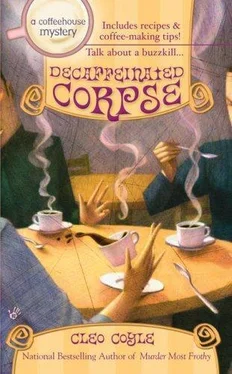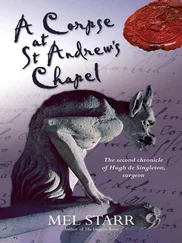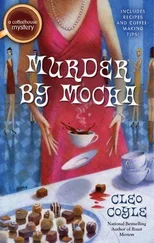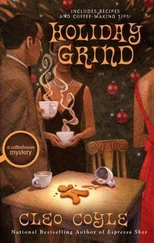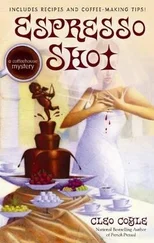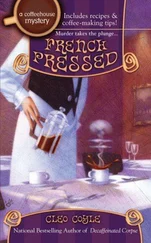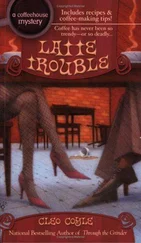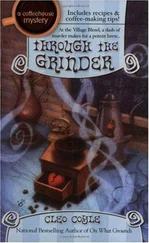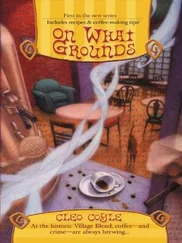Клео Коул - Decaffeinated Corpse
Здесь есть возможность читать онлайн «Клео Коул - Decaffeinated Corpse» весь текст электронной книги совершенно бесплатно (целиком полную версию без сокращений). В некоторых случаях можно слушать аудио, скачать через торрент в формате fb2 и присутствует краткое содержание. Год выпуска: 2007, ISBN: 2007, Издательство: Berkley, Жанр: Детектив, на английском языке. Описание произведения, (предисловие) а так же отзывы посетителей доступны на портале библиотеки ЛибКат.
- Название:Decaffeinated Corpse
- Автор:
- Издательство:Berkley
- Жанр:
- Год:2007
- ISBN:978-1-436-25369-7
- Рейтинг книги:5 / 5. Голосов: 1
-
Избранное:Добавить в избранное
- Отзывы:
-
Ваша оценка:
- 100
- 1
- 2
- 3
- 4
- 5
Decaffeinated Corpse: краткое содержание, описание и аннотация
Предлагаем к чтению аннотацию, описание, краткое содержание или предисловие (зависит от того, что написал сам автор книги «Decaffeinated Corpse»). Если вы не нашли необходимую информацию о книге — напишите в комментариях, мы постараемся отыскать её.
Decaffeinated Corpse — читать онлайн бесплатно полную книгу (весь текст) целиком
Ниже представлен текст книги, разбитый по страницам. Система сохранения места последней прочитанной страницы, позволяет с удобством читать онлайн бесплатно книгу «Decaffeinated Corpse», без необходимости каждый раз заново искать на чём Вы остановились. Поставьте закладку, и сможете в любой момент перейти на страницу, на которой закончили чтение.
Интервал:
Закладка:
The Upper East Side address was in one of the city’s most exclusive neighborhoods, and because the Beekman was literally steps away from the UN, it hosted more than its share of foreign dignitaries along with upscale leisure travelers.
Two small elevators delivered us to the Top of the Tower, the hotel’s penthouse restaurant. The event space was elegantly appointed with a polished floor of forest green tile and walls of muted sandstone. A dark wood bar was located to the right, a grand piano to the left, but the dominating feature was the panoramic view. Burgundy curtains had been pulled back to reveal Midtown Manhattan’s glimmering lights beyond soaring panes of thick glass. A narrow, open-air balcony, accessed from the side of the room, jutted out just below the tall windows, allowing guests a bracing breath of fresh air.
As soon as we arrived, my baristas began unpacking the fragile French presses and the two hundred Village Blend coffee cups—not the usual paper but porcelain, which we specifically used when catering. I checked in with the kitchen manager, one floor below, then visited the ladies’ room, and when I returned to the Top of the Tower event space, I found my staff embroiled in another caf versus decaf discussion.
“I know why we’re here tonight, but this whole anti-caffeine movement offends me,” Esther grumbled. “Creative artists have thrived on the stuff for centuries.”
“Word,” said Gardner.
“I know an artist who actually paints with coffee,” Dante noted. He folded and unfolded his arms, as if he were itching to roll up his long sleeves and show off his tattoos. “But I’d say artists and coffee have gone together for a long time. Take Café Central...”
“What’s that?” Tucker asked. “More competition for the Blend?”
Dante laughed. “Café Central was the hangout for painters in turn-of-the-century Austria.”
I smiled, remembering my art history classes. “Klimt hung out there, right?”
“That’s right, Ms. Cosi,” Dante said.
It made sense that Dante admired Gustav Klimt. The artist created works on surfaces beyond traditional canvas. He’d also been a founding member of the Vienna Secession, a group of late nineteenth century artists who were primarily interested in exploring the possibilities of art outside the confines of academic tradition. “To every age its art and to art its freedom” was their motto.
“Lev Bronstein hung out at Café Central, too,” Dante added.
“Lev who?” Tucker asked.
Dante shifted back and forth on his red Keds. “He’s better known as Leon Trotsky.”
“Oh, Trotsky!” Tucker cried, nodding, then began to sing: “Don’t turn around... the Kommissar’s in town... and drinking lattes !”
I burst out laughing.
Esther, Gardner, and Dante just stared. Apparently, they were too young to remember “Der Kommissar.”
“It’s old New Wave,” I tried to explain. “A pop eighties send-up of cold war communism—”
Tucker waved his hand. “Don’t even try, Clare.”
Good god, I thought. Did I actually use the phrase “old” New Wave?
Folding his arms, Tucker leaned his lanky form against the bar. “Well, artists and political revolutionaries aren’t the only caffeine addicts. Did you know when David Lynch is directing a film, he downs bottomless pots of coffee and gallons of double chocolate milkshakes to maintain a constant caffeine buzz?”
“And did you know Honoré de Balzac drank forty cups a day?” Esther noted. After a rather long pause in the conversation, she felt the need to add: “Balzac was a nineteenth-century French writer.”
Tucker rolled his eyes. “You may not remember ‘Der Kommissar,’ Esther, but we know who Balzac is.... Now are you sure you know who David Lynch is? Or do Holly-wood movies offend your literary sensibilities?”
Esther narrowed her eyes as she adjusted her black glasses. “Actually, Lynch is an acceptable postmodern filmmaker. His short films are particularly effective.”
Tucker threw up his hands. “Well, I’m sure he’ll be glad to hear you approve.”
Gardner stroked his goatee. “Lynch also uses coffee as an image system. You can see it in Twin Peaks and especially Mulholland Drive .”
Esther, Tucker, Dante, and even I stared for a moment in dumbfounded silence.
We were used to hearing Gardner discuss music theory or bebop versus West Coast jazz, but we’d never heard him wax philosophical about “image systems” in film before.
“What gives?” Tucker asked, raising an eyebrow.
Gardner shrugged. “My new girlfriend works at the Museum of the Moving Image, and she likes Lynch. Anyway, she’s right. If you watch his movies, you’ll see the guy’s seriously into coffee.”
“I wish my new boyfriend were as well connected as your new girlfriend,” Tucker said with a sigh. “If she hears about any new TV series in pre-production over at Astoria Studios let me know, okay? Off-Broadway’s good for the artistic soul, but I need a paycheck like my last one.”
I cleared my throat and gestured in the direction of the two elevators, where a group of men and women were waving their invitations.
“Speaking of paychecks,” I told my staff, “it’s time we earned ours.”
The space filled steadily after that. I acted as the hostess, greeting each new elevator full of people as it arrived. Matt should have been doing this, but although he’d arrived looking gorgeous in a sharply tailored black dinner jacket, he was now talking constantly on his cell phone.
Tonight’s guests were culled from a list that included trade magazine writers and food critics from many nations, all of them looking for a brand new angle or a breakout product while they covered the International Coffee Growers Exhibition. These men wore jackets and ties, the women tailored business suits.
Convention attendees and members of international coffee cartels were far more affluent, and generally arrived in evening clothes, their escorts or obscenely young trophy wives resplendent in shimmering gowns—an indication they had more elegant parties to attend after the tasting ended.
Local chefs had been invited as well. I spotted celebrity chef Robbie Gray. His famous restaurant, Anatomy, featured delicacies made of organ bits. Basically, the man had become famous serving animal parts most American housewives wouldn’t be caught dead feeding to anything but the garbage disposal, but his three-star rating was no joke, and if he liked what he tasted tonight, the Blend could land a lucrative contract to provide him with our micro-roasted Gostwick Estate Reserve Decaf.
To keep Robbie and the rest of the arriving guests in a jovial mood, we began to serve brie, a variety of wines, and Italian sesame cookies—delicate nibbles that wouldn’t hijack anyone’s taste buds. Before the actual tasting of the Gostwick Decaf, we would serve glasses of sparkling water so guests could clear their palate.
After about twenty minutes of greeting guests, I was becoming annoyed. I was supposed to be helping Matt and Ric throw this press tasting, not running the show solo. But Matt continued to keep his ear glued to his phone. Finally, as I moved to greet yet another batch of arrivals, Ric stepped up to take over. With a nod, I returned to the bar.
A few minutes later, I noticed Matt’s mother exiting the elevator. Madame’s escort this evening was her longtime beau, Gary McTavish. The good doctor looked quite dashing in a dark suit and Scottish plaid waistcoat. Madame was dressed stylishly, as well, in a charcoal cocktail dress trimmed in silver, her necklace and earrings simple delicate twists of platinum. Instead of her usual relaxed, confident self, however, she appeared agitated.
Читать дальшеИнтервал:
Закладка:
Похожие книги на «Decaffeinated Corpse»
Представляем Вашему вниманию похожие книги на «Decaffeinated Corpse» списком для выбора. Мы отобрали схожую по названию и смыслу литературу в надежде предоставить читателям больше вариантов отыскать новые, интересные, ещё непрочитанные произведения.
Обсуждение, отзывы о книге «Decaffeinated Corpse» и просто собственные мнения читателей. Оставьте ваши комментарии, напишите, что Вы думаете о произведении, его смысле или главных героях. Укажите что конкретно понравилось, а что нет, и почему Вы так считаете.
